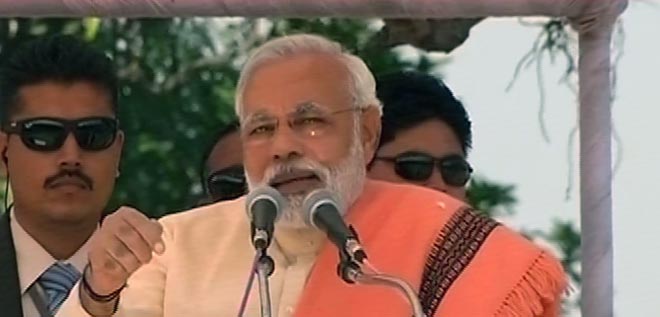The Modi government completed four years in power last week. In these four years, it has brought many economic and social reforms in the country including some historic ones like GST, Insolvency and Bankruptcy Code (IBC) and Pradhan Mantri Jan Dhan Yojana. The government improved fiscal deficit of the country which was at 5% due to economic mismanagement by the Congress Party. As the government enters its last year, the question looming over the minds of policy watchers is whether the NDA will go populist in terms of economic policy to win the next elections, or maintain fiscal discipline as it had done so over the past 4 years?
PM Modi has brought the macroeconomic status of the country to a significantly better condition than what he inherited from the previous corrupt Congress regime. The fiscal deficit has come down from about 5% of the gross domestic product (GDP) in 2012-13 to 3.5% of GDP in 2017-18. The inflation rate has been brought down at 4.28 percent from 10 percent in 2012. The unemployment rate is coming down because job creation in the country is very high, while GDP growth of the country is at a remarkable 8% since the last fiscal quarter. The sound macroeconomic conditions will help India to attain Arun Jaitley’s dream of double-digit economic growth.
Economic reforms like demonetization helped the country to improve its taxpayer base. GST was a historic step to simplify the indirect tax regime, and IBC is proving to be a strong antidote to the Non Performing Assets (NPA) problem with two cases of Bhushan steel and Electrosteel already resolved. The Real Estate Regulation and Development Act (RERA) has renewed the confidence of homebuyers and investors in real estate. The welfare programs of the government over the last four years have improved the quality of life in the country significantly. The financial inclusion program under Pradhan Mantri Jan Dhan Yojana helped every family in the hinterlands of India to have a bank account. The Direct Benefit Transfer of subsidies to these accounts will remove leakages in welfare schemes. Modicare will provide healthcare benefits to 50 crore people which is almost 40% of the population of the country. Swachh Bharat scheme has improved livability index of Indian cities and is helping people to lead a cleaner and hygienic life. The Ujjwala Yojna has increased distribution of LPG in poor households, wherein earlier these poor households used dry wood or fossil fuels for cooking which is extremely harmful to health. The Atal Pension Yojana will provide pension benefits to poor people working in private and informal sectors. These schemes have genuinely helped poor people and have next to no leakage or siphoning problems. Therefore, the country is progressing towards a true welfare state. The government is working hard to achieve “Antyodaya” dream of its late ideologue Pt. Deen Dayal Upadhyaya.
The Modi government is also facing a number of challenges now such as the price of crude oil in the international market which could affect inflation, current account deficit and put pressure on government finances. The rural distress of farmers is another problem due to which BJP performed poorly in rural areas in Gujarat Assembly elections.
Coming back to the question whether the government will go populist to win upcoming Lok Sabha elections, there are very few chances of this happening because despite some odds, PM Modi is the most popular leader across the length and breadth of the country as of now.
The BJP is the most formidable party in the country, aided by master strategist Amit Shah. The party is confident of winning the upcoming Lok Sabha elections without distributing freebies. The economic advisors to the government Chairman of the Economic Advisory Council to the Prime Minister (EAC-PM), Chief economic advisor Arvind Subramanian, Principal Economic Advisor Sanjeev Sanyal are against any populist policies by the government to win elections. Therefore, the Modi government is not expected to compromise on fiscal discipline because it will be harmful to the macroeconomic stability of the country. So folks, this is not like any other previous governments. Expect no freebies, no major people pleasing policies. Expect administration to proceed even in the government’s last year!
